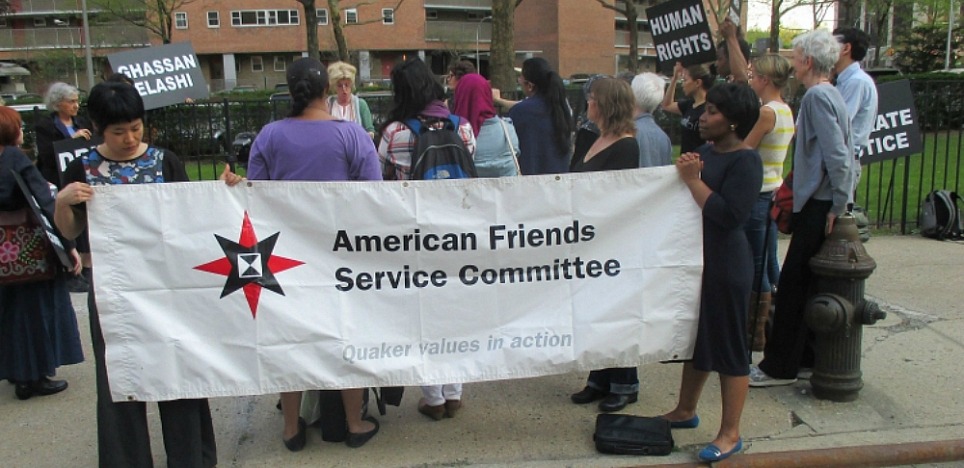Quakers founded the American Friends Service Committee (AFSC) in 1917 during World War I to give young conscientious objectors ways to serve without joining the military or taking lives. AFSC members drove ambulances, ministered to the wounded, and stayed on in Europe after the armistice to rebuild war-ravaged communities.
Following that modest beginning, the organization drew on continuing spiritual insights and worked with people of many backgrounds, nurturing the seeds of change and respect for life that transform social relations and systems. According to their website, AFSC has responded in numerous ways to human suffering, such as:
- After World War I, feeding thousands of children in Germany and Austria
- Helping distressed Appalachian mining communities find alternative means to make a living in the 1930s
- After World War II, sending aid teams to India, China, and Japan
- Giving aid to civilians on both sides of the Vietnam War and providing draft counseling to thousands of young men
- Sponsoring conferences for young diplomats in emerging African democracies
- Establishing economic development programs in Asia, Africa, and Latin America from the 1970s to the present
- Providing extensive support to the modern U.S. civil rights movement and public-school desegregation
- Working with Native Americans, immigrants, migrant workers, prisoners, low-income families, and other communities on education and justice issues
- Building peaceful communities all over the world.
In 1947, along with British Quakers, AFSC received the Nobel Peace Prize, which recognized their work "from the nameless to the nameless."
To Name This Day ...
 Spiritual Practice
Spiritual Practice
In her book A Stone Bridge North, Kate Maloy writes about a predecessor of the AFSC, John Woolman, who labored to end slavery even though he never saw the fruits of his labor:
"I think often about John Woolman, the colonial Quaker who spent most of his life speaking out against slavery when slavery was a cornerstone of his new country's economy. He never saw the cracks he made in the cornerstone, and he died a century before slavery was ever outlawed, but he never quit. He saw a grievous wrong and he pointed it out again and again and again because it was wrong.
"Woolman speaks to me across the centuries since his death. He is in my heart and soul, and he affects the way I live my life. His story is now as old as many witness trees in the nearby woods, and it is still strong, not because he reached a particular goal but because he worked on behalf of the light in every person and trusted that light to prevail.
"Not one of us will live long enough to see a fraction of the difference we make, but it is essential that we pursue our ideals anyway. Many of the first Quakers never saw freedom of religion come to England. Most of the original suffragists never got to vote. The murdered civil rights leaders did not get to see racial tensions ease. Only a few idealists live long enough to see their dreams made real, and yet their influence lives after them, and their dreams do, sometimes come true for others. Idealism at its best is not naïve but deliberately and knowingly innocent, despite the odds and evidence against it, despite the pressures of cynicism and expedience. It is forever having to renew its innocence. Woolman knew this and struggled with it every day of his life, yet he drew the deepest kind of joy from his effort, the kind of joy that announces the presence of God."
Who is your mentor for perseverance and idealism? Write a tribute to that person in your journal. When you look to someone who inspires you, you underscore the qualities you want to emulate and begin the process of integrating these qualities into your own life.
